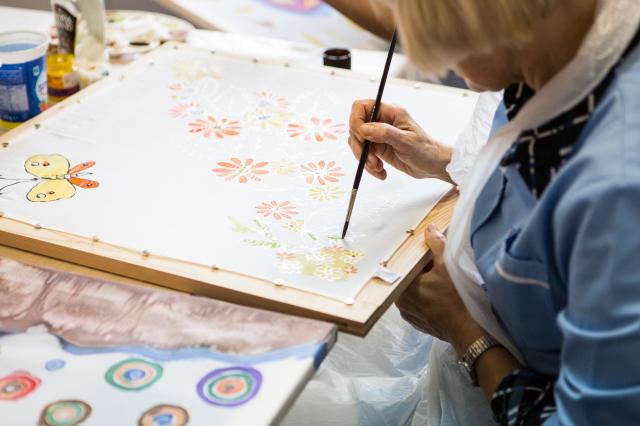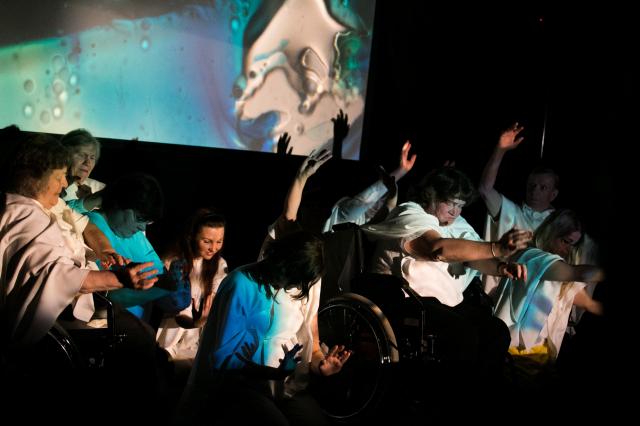Dementia friendly programming by Socialiniai meno projektai
NGO “Socialiniai meno projektai“ (SMP) implements arts for health projects which aim to promote well-being and improve people’s access to arts. The activities are organised in cross-sectorial partnership with professional artists, cultural, health and social care professionals, vulnerable groups in society, scientists and creative thinkers. The scope of the work includes arts projects (plays, exhibitions, performances, and creative experiments), creative arts (participatory) workshop programmes, training, research and publishing.
SMP projects that are focused on well-being and access to arts for people living with dementia and Alzheimer’s, their carers and family members include: “Menas žmogaus gerovei”, “Šokio laboratorija” and “Susitikime muziejuje”. In MAA project SMP developed a “Multi-sensory activity programme”
Menas žmogaus gerovei (Art for well-being)
Nursing staff face a variety of stressors at work, enhanced fatigue and a burden of responsibility. Their well-being is directly linked with the well-being of patients and quality of service they provide. The project “Menas žmogaus gerovei” focus on the well-being of nursing staff by offering them a possibility to participate in creative arts programme.
In a research project, the nursing staff took part in silk painting workshops at their workplace. In this programme participants gained new knowledge and skills, fostered personal development, increased creativity, self-esteem and empathy. Research results in the project “Menas žmogaus gerovei” revealed a positive impact on well-being, stress reduction and fatigue amongst nursing staff. Furthermore, participation increased a sense of community at work, strengthening peer relationships and impacting positively on the quality of services provided and on patients’ well-being.

“Menas žmogaus gerovei” workshop in Kaunas. Photography by Remigijus Ščerbauskas.
Šokio laboratorija (Dance Laboratory)
“Šokio laboratorija” is a project which offers the possibility of engaging in creative arts activity on an equal level, for both seniors with disabilities and their carers. In “Šokio laboratorija” trained professional dancers lead dance workshops, which offer ways to learn, to share and foster creativity in collaborative way.
This project offers social care and nursing staff the opportunity to develop both personally, and professionally. As new knowledge and skills are adapted through daily practice, social care and nursing staff are empowered to develop dance and movement activities for seniors with disabilities and other professional carers.
In collaboration with a number of residential care and day centre organisations, “Šokio laboratorija” was developed into a large scale programme, which has involved over 300 participants.

“Šokio laboratorija” performance in Vilnius. Photography by Jolita Kimsaitė.
Susitikime muziejuje (Meeting at a Museum)
SMP in collaboration with the National Gallery of Art, the Lithuanian Art Museum, the Lithuanian Museums Association and other partners have implemented a training programme for museum educators “Susitikime muziejuje”, which is based on the “Meet at MoMA” method. This programme aimed to increase access to museums and galleries for people living with Alzheimer’s and other forms of dementia.
“Susitikime muziejuje” raised awareness about the importance of museums for people from socially excluded groups in Lithuania. The programme has so far involved 30 educators from 15 museums nationally. SMP supported museum educators who have expressed an interest to start access programing in their workplaces. Here you can find the Project guideline book.
Multi-sensory activity programme in MMA
In MAA, SMP have developed a multi-sensory programme within a museum context. Three workshops programme aim to improve communication among people living with dementia, their carers and family members through participation in museum activities.
The programme was developed in these phases:
1) Exploratory visits and qualitative evaluation of communication issues in daily care settings;
2) Pilot programme delivery and evaluation;
3) Development and implementation of multi-sensory programme;
4) Qualitative evaluation.
The programme applies a variety of methods of verbal and non-verbal communication (through senses and emotions) and is sensitive to the capabilities of the audience. The flexible approach of the facilitator helps to create encouraging environment and be reflective to ensure the quality of the programme.
First visit: discussion and free art-making workshop
Discussion starts by describing the formal aspects of the paintings, and then moving towards the contextual description and emotional interpretation of the art works. Activity opens a time and space for contemplation, sharing thoughts, ideas and insights. The discussion is followed by a free art-making workshop.
Second Visit: Touching the Artwork
Participants are invited to explore artworks through touch. Covered with a cloth and uncovered artworks offer a variety of surfaces to sense, creating meaningful personal and shared group experiences. Participants challenge their imagination, evoking curiosity.
Third Visit: discussion and dance
The experience of an artwork is intertwined with dance and movement, touch, observation and emotional communication.
“Susitikime muziejuje” visit, Kaunas. Photography by Eglė Gudonytė.
